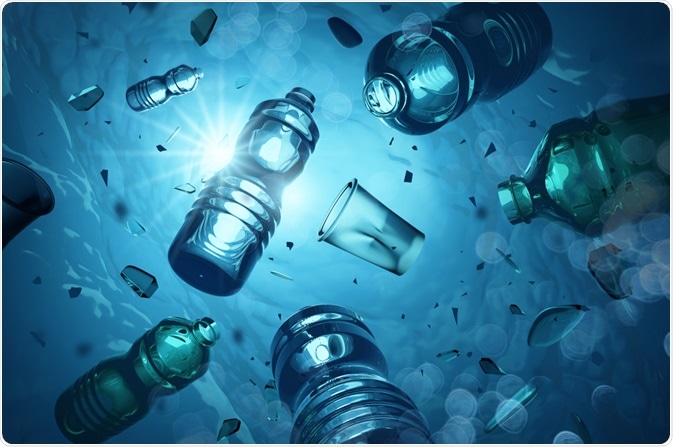Plastic pollution is currently one of the world’s most urgent environmental issues. While we are becoming more aware of the detrimental impact of plastic pollution on the health of the planet and those who inhabit it, plastic production continues to ramp up, with half of all plastics ever produced being made in the last 15 years.
Plastic Pollution
To save wildlife, the environment, and our own health from the significant impacts of plastic pollution, strategies must be implemented to reduce the levels of plastic in the environment. Recently, scientists have developed an innovative solution to reducing the volume of plastic disposed of by humans. Studies have shown that plastic-eating microbes can be used to facilitate the decomposition of the plastic.
Here, we discuss how the microbial biodegradation of plastic waste will be fundamental in addressing the increasingly pressing issue of plastic pollution.
Plastic pollution harms wildlife, the environment, and human health
Each year, our increasing need for plastic products results in roughly 8 million tons of the material finding its way into our oceans. Over many years these plastic products slowly wear down until they appear to be fully degraded. However, while plastic deteriorates, it takes hundreds of years to do this and even when the plastic is no longer visible, it still exists in our oceans and other ecosystems in the form of tiny plastic particles known as microplastic.
Microplastic has a direct impact on the health of marine wildlife. It also harms wildlife and plants in ecosystems around the world. Additionally, there is a growing body of research demonstrating the serious effect it has on human health.
Many studies have linked exposure to microplastics with numerous diseases and illnesses such as cancer. To limit the detrimental impact of plastic pollution, scientists have been striving to establish effective methods that can break down and recycle plastic.

Image Credit: solarseven/Shutterstock.com
Using microbes to ‘eat’ plastic pollution
Japanese scientists made a groundbreaking discovery back in 2016. While cleaning up sludge from an area outside of a bottle recycling location in Osaka, scientists discovered a bacteria that they observed decomposing plastic. It was theorized that the enzymes produced by the microbes were responsible for their plastic ‘eating’ ability.
Prior to this discovery, scientists had already developed chemicals that utilize enzymes to break down plastics. However, this discovery opened up the opportunity to develop a more environmentally-friendly method of cleaning up plastic waste that requires significantly less energy and is also able to target specific types of plastic. Leveraging the natural plastic ‘eating’ ability of microbes presents the possibility of developing a method that can break down plastic mixed in with trash, meaning that plastics that aren’t directed to recycling plants don’t end up polluting the oceans and the environment.
The bacteria identified in Japan in 2016 was Ideonella sakaiensis bacteria. Scientists observed that it was able to degrade a specific type of plastic known as polyethylene terephthalate (PET), a commonly used plastic for producing many single-use items such as plastic bottles. The speed at which the bacteria could break down this type of plastic was almost quick enough to mitigate the impact of millions of tons of plastic waste that are added into our ecosystems each year.
Leveraging this bacteria may, therefore, prove vital to reducing the rising levels of plastic pollution, a significant proportion of which is attributed to single-use plastics such as those often produced by PET plastics.
Since the breakthrough of 2016, much research has continued in the field of developing microbial solutions to waste degradation. In 2017, scientists at the Institute of Biomedicine & Biotechnology of Cantabria discovered that wax worm caterpillars can break down polyethylene plastic. It was theorized that the caterpillars produced an enzyme in their digestive system with the capability of degrading plastic.
We are still in the beginning stages of developing effective and scalable systems of microbial biodegradation of plastic waste, however, the initial research is promising and demonstrates the possibility of establishing microbial-based solutions that could tackle the increasing levels of plastic pollution.
How plastic pollution will be managed in the future
A 2017 study revealed that less than one-fifth of all plastic is recycled. Given that plastic production is expected to grow by 70% by 2050, to around 600 million tons of plastic produced each year, effective and sustainable solutions must be adopted on a large scale to tackle the problem of plastic pollution.
Current methods, such as using chemicals to break down plastics are not sustainable as they create other environmental issues. Therefore, it is likely that solutions that leverage microbial biodegradation of plastic waste will play a significant role in mediating the impact of plastic pollution in the near future
References:
- Puglisi, E., Romaniello, F., Galletti, S., Boccaleri, E., Frache, A. and Cocconcelli, P., 2019. Selective bacterial colonization processes on polyethylene waste samples in an abandoned landfill site. Scientific Reports, 9(1). https://www.nature.com/articles/s41598-019-50740-w#citeas
- Ru, J., Huo, Y. and Yang, Y., 2020. Microbial Degradation and Valorization of Plastic Wastes. Frontiers in Microbiology, 11. https://www.frontiersin.org/articles/10.3389/fmicb.2020.00442/full
- Siracusa, V., 2019. Microbial Degradation of Synthetic Biopolymers Waste. Polymers, 11(6), p.1066. https://www.ncbi.nlm.nih.gov/pmc/articles/PMC6630276/
Further Reading
Last Updated: Nov 12, 2021